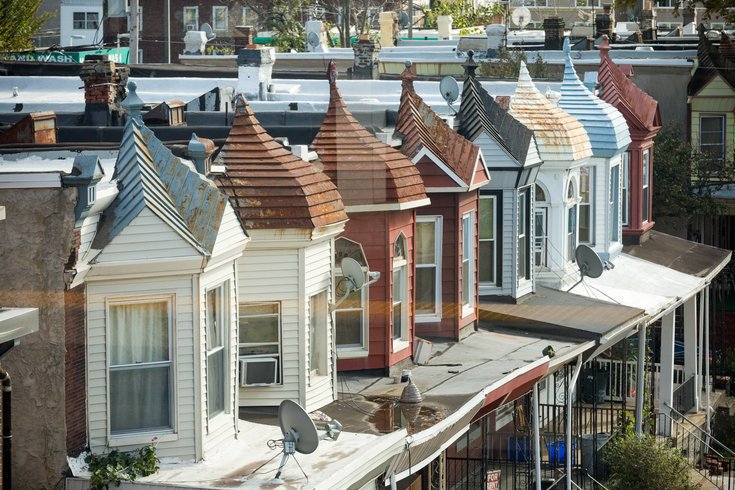
March 27, 2022
 Thom Carroll/For PhillyVoice
Thom Carroll/For PhillyVoice
The Whole-Home Repairs Act would establish a state fund for home repairs in the state. Individual homeowners would be eligible for a $50,000 grant for maintenance.
Some homeowners grappling with costly home repairs could get some relief under the Whole-Home Repairs Act, a bipartisan effort led by state Sen. Nikil Saval, who represents portions of Philadelphia.
The bill would establish a state fund, which would distribute funding to local agencies and municipalities to provide homeowners with the additional funding necessary to keep their homes in repair, which can off-shoot displacement and keep energy costs down.
Saval noted in a co-sponsorship memo in December that an estimated 280,000 occupied housing units in Pennsylvania are in need of moderate to severe repairs. Issues like leaking roofs, blown fuses, exposed wiring, unreliable heating, or failing plumbing can make the cost of living more expensive, particularly for low-income homeowners.
The state fund would be overseen by the Department of Community and Economic Development, assessing applicable homes "holistically" to establish a one-stop shop for home repairs.
In addition, Saval noted that performing regular maintenance on homes throughout the state can help make buildings more accessible for those with disabilities, and modern weatherization options can reduce the cost of utility bills.
"Hundreds of thousands of people across our state are living in homes that are unsafe because they can't afford to make the needed repairs," said Sen. Saval. "Passing the Whole-Homes Repairs Act will permanently move the needle on Pennsylvania's housing crisis."
The fund will address proposals from private and public sector organizations, many of whom have their own home repair programs that the Whole-Home Repairs Fund can replenish and flourish in order to keep low-income residents in the homes they already own, and reduce displacement.
Those agencies and organizations would then work directly with homeowners to ensure that they receive funding for maintenance projects in their homes.
Individual homeowners could receive up to $50,000 in funding for home repairs, while landlords could receive a repayable loan of that same amount. There would be additional protections for rental increases for landlords who use funding to make necessary repairs.
The bill has bipartisan support from the Republican-led state legislature. Those who do support the spending bill agree that blight is a bipartisan issue that impacts both red and blue districts throughout the state.
Three Republicans have already signaled support for the bill — Sen. Dan Laughlin of Erie County, Sen. Pat Browne in Lehigh County, and Sen. Dave Argall in Berks County.
"You're going to see blight in any town in Pennsylvania that has faced economic difficulty," Sen. Argall told WHYY. "It doesn't matter whether it's big or small. If the coal mine closed, if the steel mill closed, if the major, important employer left town, that town is going to have some challenges."
The bill would also provide funding to boost retention in workforce development programs, particularly those related to improving the "habitability" of homes. That financial support would include cash stipends for trainees and funding for apprenticeships and on-the-job training programs.
The Whole-Home Repairs Act has already received a lot of support, as exemplified during a series of rallies across the state last week. Sen. Saval began the campaign for the legislation on Monday, March 21 at Hawthorne Park alongside Rep. Dwight Evans and City Councilmember Katherine Gilmore-Richardson.
On Thursday, Gilmore-Richardson introduced a resolution in City Council to urge the Pennsylvania General Assembly to pass the bill. She and Councilmember Cynthia Parker spoke on the importance of the legislation for Philadelphia homeowners, as residents of the poorest major city in the country.
"Our homes are more than physical structures. They are our places of safety and comfort, where we gather with loved ones," said Councilmember Gilmore-Richardson. "A home is the central wealth-building tool for American families, but far too many Philadelphians are grappling with the effects of an unsafe home. The very thing that is supposed to provide stability, wealth, health, and safety is crumbling around them."
Sen. Saval hopes to secure funding for the bill through Pennsylvania's current $6 billion budget surplus, a rarity in the state. He told WHYY that while he anticipates that the legislation would require $1 billion in funding, he expects that the legislation would "scale up" to that amount over time.
The bill was introduced on March 7, and was referred to Committee, where further hearings and a vote will take place.